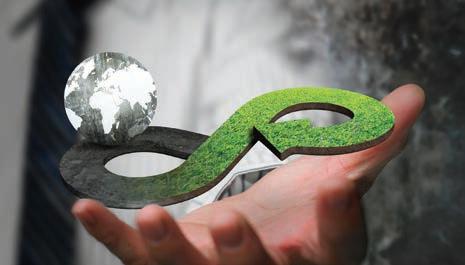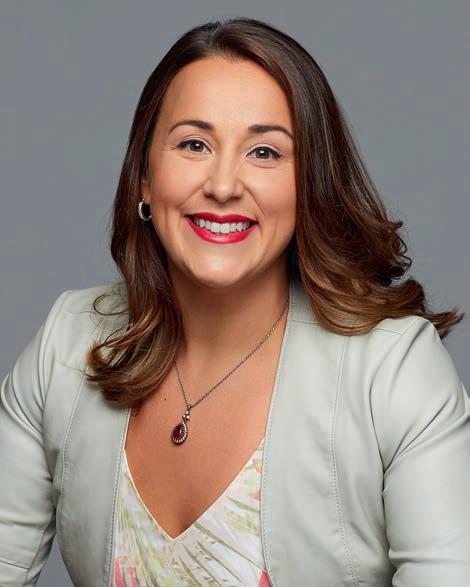
4 minute read
TOWARD A MORE CIRCULAR ECONOMY
As online shopping became more prevalent, the City funded organizations that not only help businesses set up websites, market their products and organize their supply chain, but also focus on the distribution chain to ensure that the merchandise is shipped to Montréal. "What we want," notes Véronique Doucet, "is urban delivery with smaller players, as it creates jobs and helps merchants by providing a lower cost solution that also reduces the carbon footprint."
To support the cultural and creative sector, the City created a number of initiatives such as a project involving artists and content creators working in the digital sector. That led to exhibits of art works in parks and on building facades in the 19 boroughs, an example of the circular economy where the financial support and work of one sector benefits another. Winter displays were also created to brighten commercial streets and support local shopping during the holiday season.
In the food service sector, the City is developing an alternative model of ordering and delivery, one that makes use of the social economy (see p.30). It is also important to support small and medium-sized businesses: "99% of the economic fabric of Montréal is composed of small and medium-sized firms, more than half of which have less than five employees," noted Ms. Doucet. "We are not talking about multinationals that have the means to pay for such restructuring themselves, but about smaller companies that need support, a helping hand from the community." To that end, the Economic Development Service relies on its network of experts and consultants like PME MTL, as well as some 100 partners.
The entire Montréal ecosystem is joining forces with companies to assist them during this transformation. Moreover, despite the current crisis Montréal remains attractive to foreign investors. In the first quarter of 2021, foreign investment amounted to some $622.45 million, the majority of it in the technology sector. In addition, the city has almost regained its pre-crisis level of employment, a performance that compares favourably with other Canadian cities. "We are convinced that with the collaboration of our partners, Montréal will not only regain its pre-crisis momentum but will also be able to establish a prominent position on the international scene," concludes Luc Rabouin.
Aiming for a greener, more inclusive recovery, the City of Montréal is accelerating the transition from a linear to a circular economy.
An important step has been Montréal’s commitment as the first municipal partner in Fondaction’s Circular Economy Fund. Launched on March 23, 2021, the $30M investment fund has been augmented by a $3M grant from RECYC-Québec and is a Canadian first. This venture capital fund will finance and support start-up companies in Québec that offer innovative solutions for the circular economy. Approximately 75% of initial investments will be in the agri-food, recycling, resource recovery and eco-construction sectors. Approved companies may obtain an investment ranging from $250,000 to $2M. Some might also receive a RECYCQuébec grant worth between $50,000 and $100,000.
A STRONG MESSAGE
Josée Chiasson, director of economic cluster development at the City of Montréal’s Economic Development Service, notes that "being able to create a leverage effect with a partner like Fondaction, which is able to raise additional capital, shows that the City is really sending a strong message."

JOSÉE CHIASSON
Director of economic cluster development Economic Development Service City of Montréal

MARC-ANDRÉ BINETTE
Assistant head of investment, Alternative Private Investments Fondaction Montréal is aiming "to position itself as a leader in the circular economy in North America. We have a head start, given that there is already an ecosystem in place."
In its 2021 Recovery Plan, Montréal has earmarked $8 million of its $60 million budget to ensure a shift towards the green transition. The city wants to increase the resilience of its economy "to diminish the dependency on resources and to maximize the use of resources." In line with the strategic vision of Montréal 2030 and its Climate Plan, the City wants to reduce waste and greenhouse gas emissions. The circular economy, which consists of optimizing resources at each phase of the life cycle of a good or service so as to reduce the environmental impact, is one of the solutions employed to reach that goal.
INNOVATIVE FINANCING TOOL
For Fondaction, the Circular Economy Fund is at the very heart of its mission, which is to create and maintain quality jobs while contributing to a better performing, more equitable and greener economy. "We are filling a need in the market in terms of financial innovation. It was a natural step for us; it’s in our DNA to launch a circular economy fund," said Marc-André Binette, assistant head of investment, Alternative Private Investments at Fondaction.
In his opinion, "The strength of this fund is our partnership with the City of Montréal and RECYC-Québec." In fact, companies will be assisted by RECYC-Québec experts to implement or improve circularity processes. In Montréal they will also benefit from support from Synergie Montréal (PME MTL Est-de-l’Île) for implementing circularity strategies and finding new opportunities.
A SUSTAINABLE SOLUTION
Fondaction intends to pursue its current momentum. After demonstrating the feasibility of the new circular economy fund that it intends to enhance, it will invest in growth companies.
As for the City of Montréal, it is currently drafting a roadmap. The first steps are to establish a detailed portrait of the situation in order to determine the niches that offer opportunities, and then help the ecosystem develop new projects. Secondly, the City intends to increase support for the ecosystem through coaching and networking with companies, research centres, universities and various organizations in the circular economy. As for a private fund to finance projects, it has already been established. "So we are taking action," said Josée Chiasson, "but always with a game plan that is structured for both the medium and the long term."





